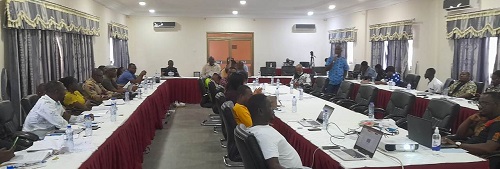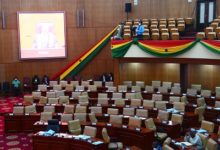
The Public Interest and Accountability Committee (PIAC) has called on parliament to be proactive in their oversight responsibilities regarding the management and utilisation of the petroleum revenue of the country.
According to PIAC, Parliament needed to act swiftly to reverse the discretionary powers being exercised by the finance ministry on the capping of the Ghana Stabilisation Fund (GSF) after the COVID-19 pandemic.
Mr Eric Keyman Defor, this to journalist at a sensitisation workshop in Koforidua on Sunday.
The Finance Minister, Ken Ofori- Atta, has lowered the cap of the amount that can be accumulated to the GSF from 300 million dollars to 100 million dollars with approval of Parliament in 2020, for the COVID-19 alleviations programme.
But PIAC was of the view that the retention of the current cap of 100 million dollars on the GSF for the year 2022 was not in accordance with the formular stipulated in L.I. 2381.
According to MrDefor, a proper application on the formular inline with the Petroleum Revenue Management Regulations (2019) LI 231, would have returned a cap of 460.63 million dollars.
“The capping is supposed to be for a particular year budget cycle, but then it extends beyond the cycle because the approval is not explicit saying that this capping is from this period and beyond that we begin to build the reserve again. So, we have maintained the cap for the past three years (2020, 2021, 2022). Even though, the events that caused the need to cap occurred in the 2020,” he stated.
Holding the cap for $100 million should there be another emergency in 2023 or price fall there would not be any reserve to support our national budget,” MrDefor added.
What Parliament needed to do, Mr Defor said, was to request a memorandum from the finance ministry to review the law that gave discretionary powers to finance minister to continue with the cap in order to check any possible abuse.
Touching on other issues, Mr Defor said about 57 per cent of PIAC recommendations had been acted on by the government, while the remaining had to do with some amendments to the law to check discretionary powers or the gaps in it.
He said the law requiring the utilisation of the Annual Budget Funding Amount (ABFA) required that 70 per cent of the money should go into capital expenditure with 30 per cent into goods and services.
“This law used to be abused but after PIAC recommendations that 77 per cent of the money goes into capital expenditure and the rest into goods and services witnessed a significant improvement,” he added.
FROM DANIEL DZIRASAH, KOFORIDUA







